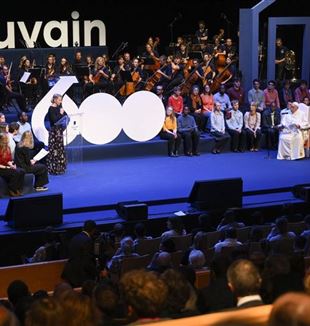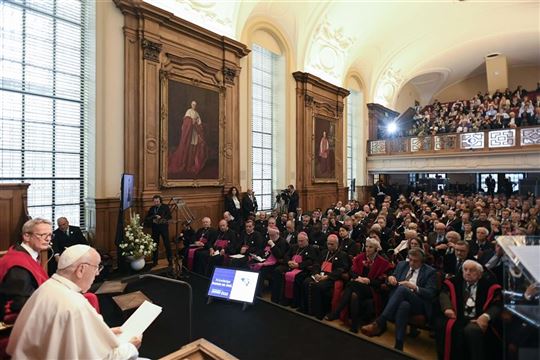
Belgium, an old hope to be rediscovered
Jan De Volder, professor at the Catholic University of Leuven, comments on Pope Francis' visit to mark the university’s 600th anniversary: “He asked us not to lose sight of the search for truth.”“I saw a combative pope. Elderly, but with enough energy to shake up a Christian community that is a little sleepy, frightened, and perplexed. We expected an old man engaged in institutional speeches, but he was much more than that. We saw him as affectionate, alert, with a sharp wit. Smart. He amazed me. He amazed us.” Jan De Volder is a professor at the Catholic University of Leuven, where he teaches in the Faculty of Theology and Religious Studies and holds the chair “Religion, Conflict and Peace.” In the aftermath of what was perhaps the most difficult trip of the entire pontificate, which took the Pope to the heart of secularized Europe for the first time, the Belgian professor tries to identify the highlights of the message brought by Pope Francis to his country. “The climate on the eve was not very favorable. Public opinion was at times skeptical, very critical, even cynical. Some, after his demanding trip to the East, thought that he would skip his visit to us. Then he arrived and, as often happens with Francis, things shifted.”
What struck you the most?
The Belgian leg began with a visit to King Philip, where Prime Minister Alexander De Croo gave a very harsh speech about sexual abuse in the Church and how the hierarchy has handled the cases that have come to light in recent years. The Pope reacted without any notes, without possibility for misunderstanding, that these were intolerable episodes and that the Church must do everything possible to ensure that they do not happen again. He asked for forgiveness and spoke of what had happened as “our shame and humiliation.” Afterwards he met with the victims of the abuse. The meeting was again criticized because people were saying that an hour’s meeting with 15 people was too little. But Francis spoke with them for nearly two hours. When leaving the meeting, the victims said that they were happy because they felt that the Pope had listened to them and had appeared moved and empathetic. I think that public opinion also appreciated this.
The university did not make things easy for him either.
The main focus of the visit was the Pope's invitation to celebrate the 600th anniversary of the founding of the Catholic University of Louvain, which in 1972 split into the Louvain campuses, the French-speaking campus (Université Catholique de Louvain or UCLouvain), and Louvain-la-Neuve, the Flemish campus (Katholieke Universiteit Leuven or KU Leuven). On Friday, there was a meeting with the professors focused on the theme of refugees, while on Saturday the Pope met with students and the theme was the encyclical Laudato si'. The University thanked the Pope for his encouragement on these two topics, but the two speeches of the two rectors reiterated several themes pertinent to the liberal culture that is dominant at the two universities: openness to the LGBTQIA+ community and to women, including the request for female priesthood. The Pope decided not to respond to these requests, but in Louvain-la-Neuve he touched on the topic of the role of women, reaffirming the classic discourse of Catholic Christian doctrine, insisting on the complementarity between men and women in the life of the Church, reiterating that they are not interchangeable realities. Some did not like it, in fact the rector issued a statement of disagreement with the Pope's words immediately after his address. On his return flight, Francis pointed out that it is not “moral” to publish a stance without taking into account what is actually being said.
Apart from the tensions, the Pope offered his views on the task of the university.
His reading was interesting, praising the academic world and asking that the frontiers of knowledge be open. He asked us not to lose sight of the search for truth, therefore criticizing ideologies that condition research and those who give up the desire to know the truth. These are useful things that are rarely heard in universities. There is much to be learned, re-read, and discussed. I cannot say whether this will happen or whether we will continue as if nothing happened. It is still too early to tell.
Read also - The Holy Father's meeting with university professors
A very important gesture was his visit to the tomb of King Baudouin.
The esteem that the Popes have had for him is well known. He resigned for two days in order not to sign the law that legalized abortion. He died a year later and there was national mourning that was deeply felt among the population. Most people considered him to be a very religious man, perhaps even too much for the average Belgian, but they saw him as an upright man who followed his conscience. His memory has faded a little today, but in these very weeks the Belgian Parliament has been discussing the possibility of a greater liberalization of abortion. The Pope did not mention this in his addresses, but he went to pray at the king's tomb and at the end of the Mass announced that he would ask that the process for his beatification be initiated. It was a surprise for everyone.
What was his message to the Christian community?
He insisted on joy and evangelization. He must have the impression that ours is a tired Church in a country that has become secularized very quickly. So he invited us to move away from a defensive stance and put ourselves at the service of the Gospel and mission. No thinking of us as a majority, but knowing that we are a minority, he asked us to have the courage to bring the message of Christ to everyone.
Read also - The Holy Father's meeting with university students
During his first address in Belgium, the Pope said that “In bearing witness to its faith in the Risen Christ, the Catholic Church wishes to be a presence offering individuals, families, societies and nations a hope both ancient and ever new. A presence helping everyone to face challenges and difficulties, not with frivolous enthusiasm or bleak pessimism, but with the certainty that humanity, loved by God, is not destined to collapse into nothingness, but is eternally called to goodness and peace.”
Yes, hope was precisely the theme of this visit, “En route avec Espérance.” The Pope perceives Belgium as a somewhat depressed place, especially for the Church and for Christians, and so he wanted to propose the old hope, which is rooted in the Gospel, in the message of Christ who conquered evil and death on the cross. But he also reiterated that this impetus can be lived with new vigor in our time. The message of youthful hope coming from an 88-year-old man. The frailty of his body enhanced the strength of his words. It was a crucial visit conceived as an invitation to life. This I think struck a chord with many people, certainly young people. There were several thousand people at the vigil with young people. There was no plan for the Pope to go, but he wanted to be there. It was a festive moment, where you saw young people who want to be Christians. The Mass was a time of celebration, but also a time of prayer. The silence was true silence.
Read also - Pope Francis: “Peace is a task"
So there is life in Belgium too....
The Church in Belgium is not dead or in danger of dying. There are people who want to live Christianity in a fresh and new, joyful way, without too many ideological debates, which is more typical of the older generation. Young people are immersed in a context of woke culture, even at university. But there are many young people, perhaps less intellectual, although many of them will become intellectuals, who nevertheless have a desire to experience Christianity in a new way. This was a discovery for the media, because it is a world that newspapers never or only rarely talk about. But the Pope's visit also stimulated this visibility; this vigil would not have happened without him. It was an explosion of joy. For me, it was perhaps the most beautiful moment of the visit.